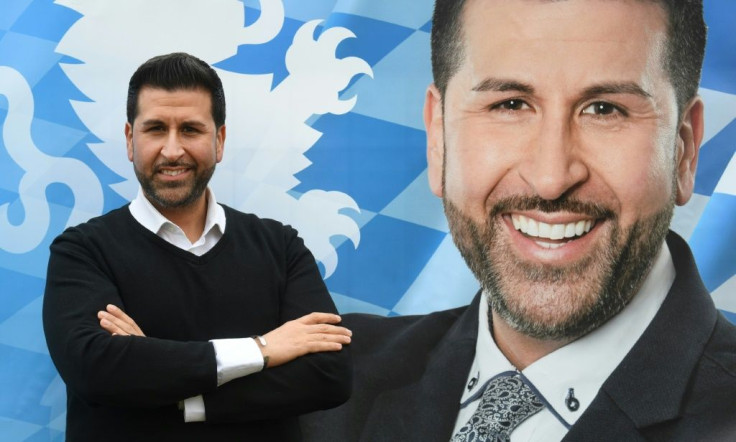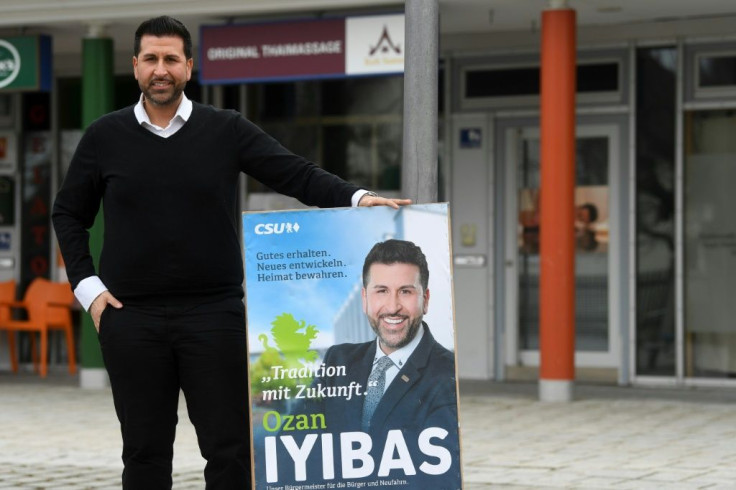The Muslim Running For Mayor In Christian Bavaria

With his neatly trimmed beard, sharp suit and broad smile, Ozan Iyibas looks like a typical politician out to win votes ahead of a municipal election in southern Germany's Bavaria region.
But he has unleashed a mini earthquake with his candidacy -- as the first Muslim standing for the Christian Social Union (CSU) in a predominantly Catholic region.
"I don't see any contradiction in this choice," says the 37-year-old, sitting back in an armchair and clutching a mug of tea in the town of Neufahrn.
"It's a question of values. The values of my religion are very close to those of Christians."
While Iyibas won the local CSU's nomination unanimously, such support is not always a given in the region where party chief Markus Soeder in 2018 ordered crosses to be displayed at the entrances of all public buildings, as a way of honouring the region's "cultural heritage".
In another Bavarian village, Wallerstein, resistance from local CSU members was so great against a Muslim candidate that the hopeful was forced to pull out of the race.
"It was not about me, but about my faith. For example, an argument is that the C in CSU and I as a Muslim did not go together," Sener Sahin told Sueddeutsche Zeitung.
Party top brass had sought to intervene in Sahin's favour, but the rank and file would not budge, even though Sahin is a successful entrepreneur who was both player and trainer in the village football club and whose wife is Catholic.
The CSU, sister party of Chancellor Angela Merkel's Christian Democratic Union (CDU), has been the dominating force in Bavaria since the end of World War II.
But the far-right and Islamophobic AfD, and the ecologist Greens, have in recent years chipped away at that support, which at the last state elections in 2018 hit its lowest level since 1954.
In recent years the CSU has swung between lurching right to save its conservative vote, and veering left to win back younger, ecologically minded voters.
In Neufahrn, the CSU is counting on Iyibas' unusual profile to rejuvenate the party and wrest the mayoral post from the Greens at the March 15 vote.
The consultant for start-ups was born just a few kilometres (miles) away from the town where he grew up in the suburbs of Munich.

When he crosses paths with someone he knows, they discuss the local economy, public transport, the environment -- but not religion.
"In my opinion, the most important issue is housing," says Erica, a pensioner who he meets at the entrance to a grocery store.
"The religion of the candidates makes no difference."
Iyibas, who is of Turkish origin and an adherent of Alevism, a secular branch of Islam, said he has been brought up to feel at ease in a predominantly Catholic environment from a young age.
"When I was little, my mother took me to a church and I asked her why. She replied that if we were going to live here, we needed to understand and share the values of this country. That's what I have done."
Stefan Wurster, a professor of political studies at the Bavarian School of Public Policy, has noted that "many Germans from migrant backgrounds believe in conservative values that correspond with those of the CSU."
The conflict in the party today, he says, is "less between Christians and Muslims, and more between religious people and atheists".
Iyibas is also convinced his party is changing.
For him, a "new conservatism" could arise that "honours tradition but innovates at the same time".
And he is hopeful that "in five or 10 years' time, (religion) won't be an issue".
But he still faces an uphill battle to win over local far-right supporters.
AfD members have branded him an "enemy" on Facebook, and have told him that they "will fight against a Muslim mayor".
© Copyright AFP 2024. All rights reserved.





















